Paros - the Greek paradise island that wants to ditch plastic
- Published
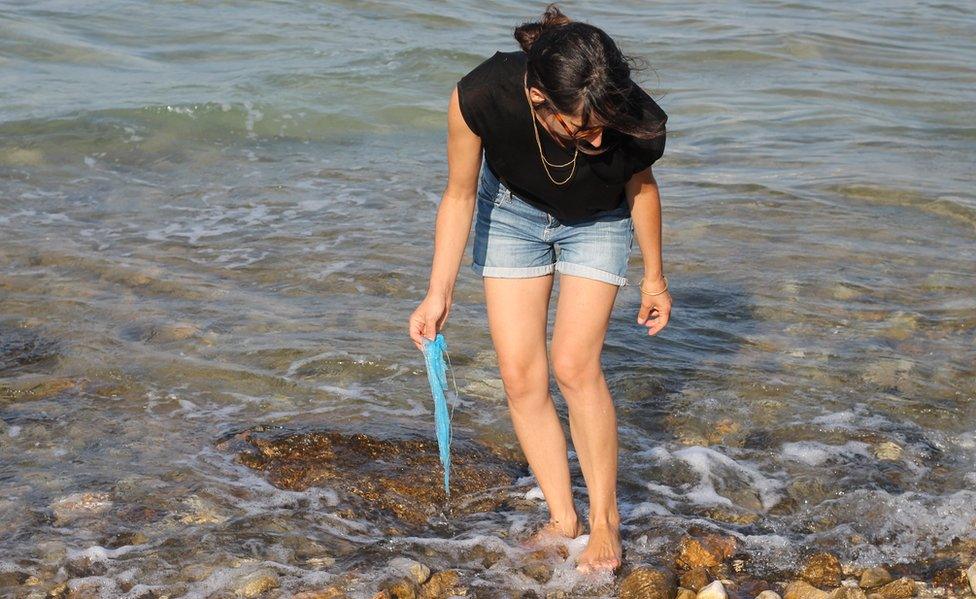
Paros faces a huge challenge in cutting plastic waste because of its big summer tourist influx
The sun dips towards the sea on Xifara beach as Stella Cervello walks along, picking up handfuls of plastic waste. There are shredded plastic bags, a glowstick from a rave on nearby Mykonos and even a food carton from Turkey.
"Look, you can see all the microplastics," she says, pointing at a mass of coloured dots bobbing on the waves.
Like many islands in Greece's Cycladic region, waste production on the island of Paros explodes in summer when over 400,000 tourists join a local population of just 13,000.
Paros is now at the centre of a drive to turn itself into the world's first island that is truly free of plastic waste. It looks like quite a challenge.

Plastic waste is clearly visible in the waves off Paros
In high season, the white-and-blue painted cafes that line the picturesque streets get through 1,000 plastic takeaway cups a day. Thousands of plastic bottles of water are shipped in daily, because many believe the tap water is undrinkable, although the water company insists that is wrong.
"You are really exposed to the reality of the situation when you live by the sea," says campaigner Zana Kontamanoli.
The Greek waste management system suffered heavy cuts during the country's financial crisis, meaning recycling is often not separated and many landfill sites are not up to EU standards.
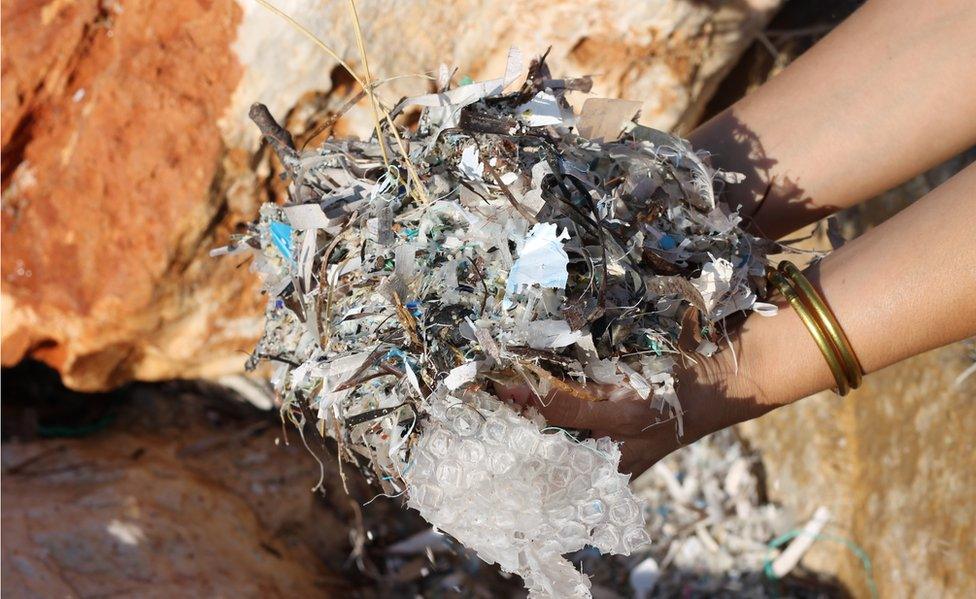
A walk along the beach yields handfuls of plastic detritus
A shocking 95% of waste in the Mediterranean is plastic.
But within three years this may change.
Why Paros is a good place to start
Paros residents Stella Cervello and Zana Kontamanoli are behind the Clean Blue Paros initiative that involves the local municipality as well as several NGOs.
"I was really shocked when I arrived. I could not believe how many plastic cups were flying around by the beach," says Ms Cervello, who began trying to make the island more sustainable when she moved here from France in 2016.
And while she was starting up a Facebook group and talking to businesses about possible alternatives to plastic, Jo Royle from the charity Common Seas was trying to identify a Mediterranean island that could become a model for a future free of plastic waste.
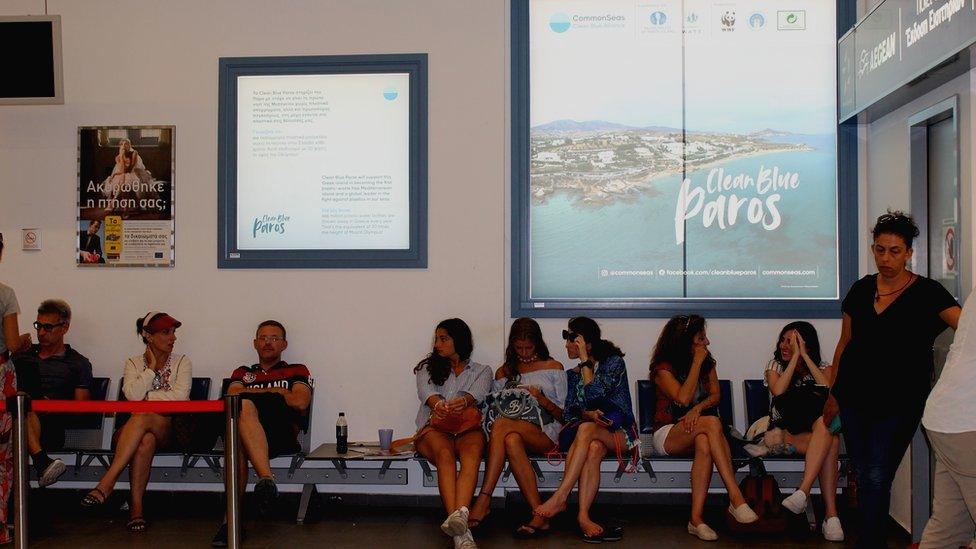
Posters declaring Paros's future intent have been put up in the local airport
"Islands provide a microcosm of a system that allows us to clearly see material flows," says Ms Royle. "We've got one port where everything comes in and goes off so we can really evaluate whether the systems we're piloting work."
Paros was chosen because its changes in population give it complexity and because she found out when she visited the island that people were already working on the issue.
Other islands such as the Seychelles archipelago have banned single-use plastics, but this is the first time an entirely new approach is being taken to make an island completely free of plastic waste.
Huge signs now greet tourists at the airport to tell them about the Paros initiative. "It's what the island needs," says Ms Cervello.
The team's first task was to convince as many local businesses as possible to drop "pointless plastics" such as straws and bottled water. "Out of 70 businesses we've spoken to, 50 have signed up," says Zana Kontamanoli.

How Paros's businesses are being asked to help
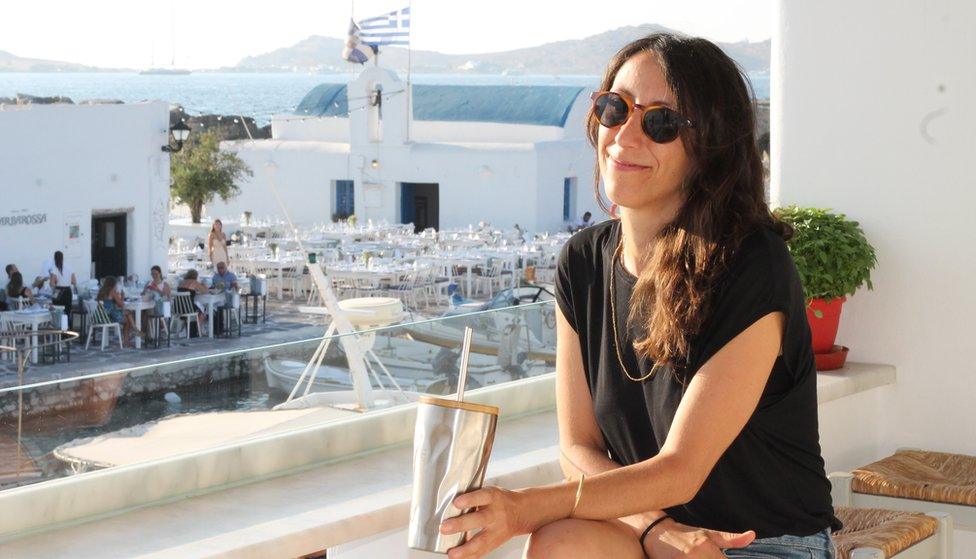
Reusable cups are a key part of the "Clear Blue Paros" project
Understand the plastics you use and identify the problem plastics
Commit to reducing water bottles, straws, coffee cups and bags
Carry out changes and manage recycling
Assess the impact of your changes

Another big challenge is overhauling waste management.
Fourteen businesses are piloting the separate collection of plastic cups and bottles which have a higher value recycle rate.
The plastic will then be recycled on the mainland into something that can return to the island, such as benches.
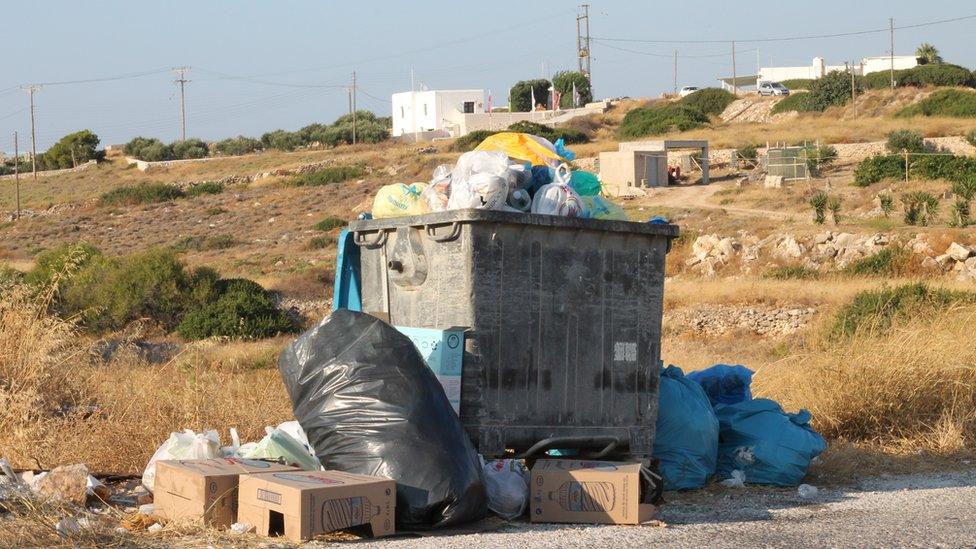
Open-top bins on Paros mean that winds can blow the rubbish into the sea
"Research shows that when recycling is separated, people are less likely to just chuck all their waste in and contaminate it," says Kontamanoli.
The big challenges ahead
However, there are still many obstacles facing the team. Most bins on the island do not close, so the strong Aegean winds blow waste into the sea.
And while many residents are enthusiastic about the project, there are still some that need convincing.


"Not serving bottled water has harmed us," admits Andy Kirk, owner of Nemobar, the first business to sign up to the scheme. "Even when we explain we have a water filter, many customers don't like it. But we've stuck to our guns."
Another sticking point has been convincing bakeries and pharmacies to stop using plastic bags.
The team has managed to collect thousands of used hotel bed sheets, which would usually be sent to landfill, and are making them into tote bags.
"In our audit we found that on some parts of the island 60% of waste was recyclable, so there needs to be more education," says Kontamanoli.
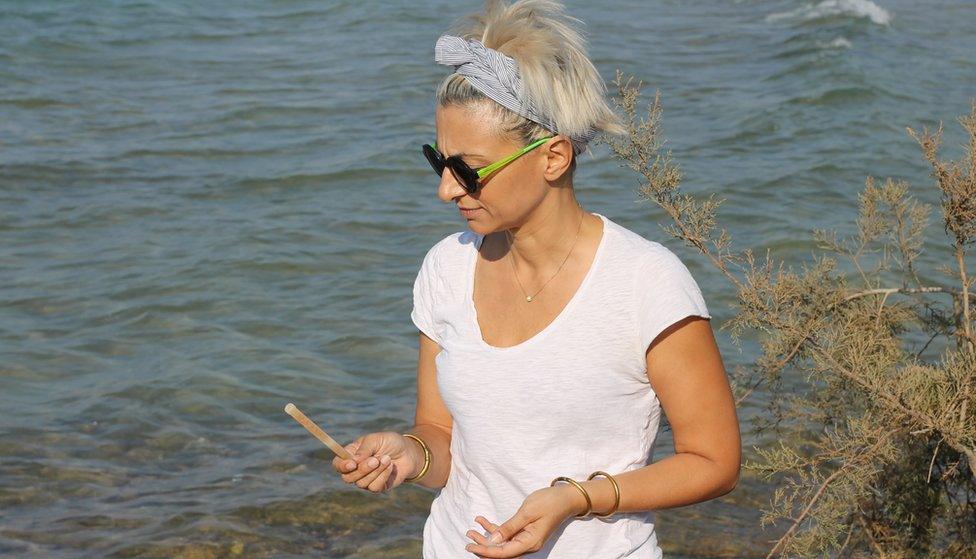
Zana Kontamanoli picks up glowstick on the beach
The team is focusing its education efforts on the island's 2,500 schoolchildren.
Most drink one small bottle of water a day each, so they are being given refillable bottles while water filters are being installed at schools. "Children are powerful drivers of change because they go home and talk to their parents about it," says Zana Kontamanoli.
Although they are only six months in, the team are optimistic that big changes can be made as soon as the tourist season is over and residents have more time on their hands to overhaul how they do things.
"Plastic pollution is very complex and there's not one solution," says Jo Royle. "But we hope if these systems work they can be applied elsewhere too."

Plastics and the sea - a global problem
The metal box that accidentally discovered the history of ocean plastics.
